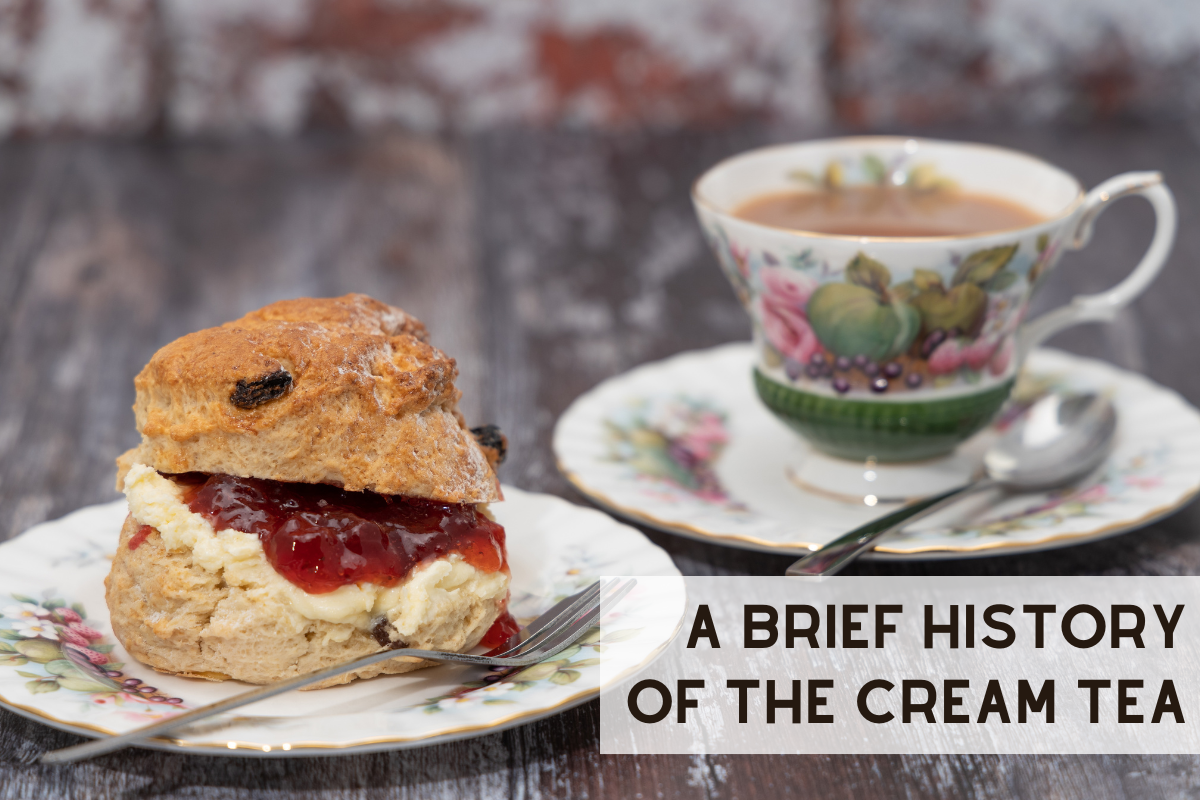
Did you know that the cream tea was invented right here in Devon? Well… kind of, anyway!
The origin of the cream tea is often a point of friendly contention (we see you, Cornwall!), but local historians generally agree that the tradition of adding sweet fruit and cream to bread began in Tavistock.
In the late 10th century, after a band of Vikings plundered and damaged the Tavistock Abbey, local workers helped rebuild it. Grateful for their efforts, the monks rewarded these workers with bread and ‘clowted cream.’ This treat became so popular that the monks continued to serve it to travellers and guests.
A cream tea back then looked quite different from today’s version. For starters, there was no tea as this delicacy didn't arrive in England until the 17th century, and it only became widely popular in the 1800s. However, ‘clowted cream’, a Devon specialty, was definitely part of the treat. Clotted cream was made by straining fresh cow's milk, allowing the cream to rise, heating it, and then cooling it slowly. The name ‘clowted’ comes from ‘clout,’ an old word for a patch of cloth, resembling the cream's crust.
The bread and ‘clowted cream’ of the 10th century wouldn't have been topped with strawberry jam as sugar was not yet available in England. Instead, workers likely enjoyed their treat with honey or fruit pulp mixed with honey, creating a jellied sweet texture. Initially, the fruit used in Devon was probably whortleberry or ‘hurt,’ a local name for wild blueberries found on Dartmoor and Exmoor.
Devon can't claim the scone's origin though. Scones likely originated in Scotland in the early 1500s as a type of quick bread made with oats and griddle-baked. The term "scone" might come from the Dutch ‘schoonbrot’ (beautiful bread) or the Stone of Destiny where Scottish kings were crowned. With the advent of baking powder in the mid-19th century, scones became the oven-baked treats we know today.
Before scones, jam (or fruit) and cream were served on a type of yeast bun, more like a semi-sweet roll. These buns had various names across Devon, such as Cut-Rounds, Chudleys, Farthings, Ashburtons, and Tuffs.
Following the tourism boom in the 1850s, Devon tea rooms started serving these afternoon treats, calling them ‘cream teas.’ Initially, they tried to stick to traditional Devon buns, but scones eventually became the norm. However, with a renewed interest in baking, old recipes are making a comeback.
The modern cream tea we adore today consists of a warm, freshly baked scone, topped with sumptuous, clotted cream and tangy strawberry jam, all paired with a steaming pot of tea. Yum!
Different from a regular cream tea, afternoon tea was introduced in the mid-19th century by the Duchess of Bedford, who requested bread, butter, cake and tea at around 4pm. This soon evolved into a social event, and by the 1880s, it was a fashionable activity for upper-class women to dress up and enjoy their afternoon treat. Today, afternoon tea is popular across the UK, but of course, Devon does it best (not that we’re biased!). From themed teas to traditional spreads, you’ll find finger sandwiches, scones, sweet treats, and perhaps a glass of bubbly for you and your loved ones to enjoy. Discover our most Instagram-worthy cream teas in South Devon here.
So, when you’re visiting one of our cities, towns or villages, indulging in a cream tea should absolutely be on your South Devon bucket-list! Devon and Cornwall are both famous for their cream teas, and trying one is almost a rite of passage for visitors to these counties. The debate over whether to put the cream or jam first has long divided our West Country neighbours. Here in South Devon, we firmly believe in putting the cream first, but honestly, as long as you're savouring every bite, there's no need to stress about it! For a list of the best places to enjoy a cream tea in South Devon, check out our top recommendations here.
Stay updated on all things South Devon by signing up for our e-newsletter, or following us on Facebook, Instagram, TikTok and X. We’ll keep you posted on upcoming events, new blog posts, competitions and more.
Related
Comments
Comments are disabled for this post.



 to add an item to your Itinerary basket.
to add an item to your Itinerary basket.









